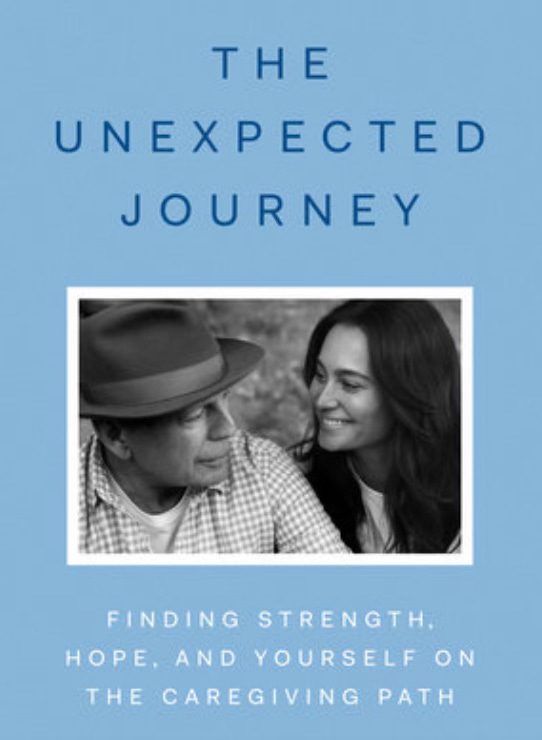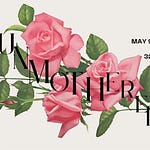Allow me to start in the middle. Or from the end. It’s hard to tell. I am here now making sense of it all in some kind of Super 8 home movie review or fever dream. It was somewhere ten-ish years before my Dad died of Alzheimer’s.
Cut to the part of the film where we find the family in Dad’s one bedroom condo in Chappaqua.
It arrives like a familiar stranger. Dad was repeating himself. We gently told him, with a laugh on board, that he had already told us whatever it was as the story unfolded. I think now that he was remembering then, that he was forgetting. We found list after list, a beautiful mind style, of all of our names that he practiced on page after page in secret, so as not to forget. That painful knowing. He had a famously great sense of humor. His timing was his secret sauce.
He held up two fingers, like a peace sign and said, “If you have heard it already, just give me the sign.” We laughed and we practiced this with him and for him – until it was so frequent, he did not recall the very secret code he created. It's slow and easy, the way it sneaks in and sneaks up. It dresses up like regular old, old age and dresses you down when you are not looking.

We had no idea what we were in for, when we were in it. That is the curse of Alzheimer’s and for my Dad in some ways and on some days, perhaps the blessing. Mild Cognitive Impairment was his initial diagnosis and how it unfurls, different for everyone. It was then, that we had some of the most difficult and important conversations in all of our lives. What did he want as the disease progressed? Did he have his will and wishes in place? I hope you too will have these, they help, I promise.
We left him notes and reminders and added daily caretakers. We placed an outfit of the day in a basket so he knew which clothes were clean and where they were. There was a phone with oversized photos of us all programmed to auto dial when he forgot how to use the cell. There was the Road I.D., a cool black rubber bracelet with an engraved plate with emergency contacts that many runners and cyclists wear. It once helped us when he wandered from home and did not know his way back.
The more we share what we know and learn, the easier it will be for others along the long arc of a life along side memory loss. There are so many hopeful and helpful supports for caretakers and families. A new 38 minute documentary film called Taking Care: The Legacies We’ll Accept and Those We Won’t, is directed and produced by award-winning filmmaker James Keach, and executive produced by Lauren Miller Rogen and Seth Rogen. It features the story of Lauren and Seth's courtship and marriage as their families face the complexities and heartbreak of Lauren's mother's advancing early-onset Alzheimer's disease. Through humor, heart, and an unwavering commitment to change, Taking Care takes us inside their lives and behind the scenes of what it can look like for families.
“This film is a part of us, as deeply personal as our journey with Alzheimer’s. We want to foster a sense of hope, empathy, and understanding in our audiences. We hope viewers will be inspired to improve their brain health, support caregivers, and advocate for a future centered on dementia prevention, treatment, and support. The time to take care is now.” - Seth and Lauren Rogen
The two also started Hilarity For Charity. HRC offers celebrity events for fundraising and respite funding for caretakers.
HFC respite grants cover the cost of professional, in-home or Adult Day Center care so you can feel confident about the care being provided to your person while you take some time for yourself.
They grant two types of awards:
In-Home Respite Grant- 100 hours total of respite care to be used within 3 months of being awarded
Adult Day Center Respite Grant- 24 days of respite care to be used within 3 months of the first date of care
The day Emma Heming Willis’ husband, Bruce Willis, was diagnosed with frontotemporal dementia (FTD), all they were given was a pamphlet and told to check back in a few months. My family did not even receive a pamphlet—I so relate.
With no hope or direction, Emma walked out of that doctor’s appointment frozen with fear, confusion and a sense that her world had just fallen apart.
At that devastating time, Emma just wanted someone who'd been through it to tell her, “This feels terrible right now. Your life is in shambles. But it’s going to be okay. Here are some things to think about and put in place so you cannot just survive but thrive.”
Her new book, The Unexpected Journey: Finding Strength, Hope and Yourself on the Caregiving Path is due out in September and available for pre-order. It is the book I wish we had and the reason she wrote it from the center of her own journey as a care partner.
It is a supportive guide to navigating the complicated, heartbreaking, and transformative experience that is caregiving for your loved one. Weaving her personal journey with the latest research and insights from the world’s top dementia, caregiving, and integrative experts she offers the guidance and wisdom caregivers everywhere so desperately need to hear, including:
A diagnosis isn’t just a label, it’s a starting point. It helps you better understand your person’s behavior and respond with more clarity and compassion.
Taking care of yourself is not optional; it's mandatory. It will make you a better care partner. It’s not selfish, it’s self-preserving.
You don’t have a choice about being on the dementia caregiving journey. But you do have a choice in terms of how you approach it and reframe it.
Caregivers are human so you aren’t always going to be patient and selfless. You have challenges and struggle with conflicting emotions and that’s okay.
Ultimately, The Unexpected Journey shows you how to care for yourself while doing one of the hardest, most heartbreaking jobs in the world. Because if you don’t take care of yourself, you are not going to be able to look after anyone else—especially your loved one with dementia.
“I know that no two caregiving journeys are the same, but we are connected by the same unchosen thread. It’s not an easy path for you, your loved one or your family. But I’m here to let you know that you are not alone, and, in time, you will find your footing, and a way forward." - Emma Hemming Willis
I support caregivers alongside the anticipatory grief of memory loss and illness. What I have learned from clients, is that it is hard to stop and care for yourself from the inside of the experience, but necessary. Here is my conversation with Emma and her business partner Helen on their Make Time podcast.
Please don’t go it alone. I had my siblings and the eventual support of memory care experts, palliative care and hospice to guide us in the unknown. I wish I had found community and sources sooner. As vetted resources and tools become available and accessible, I will continue to share them here.
My greatest hope is that they will be of service, and that you will share this newsletter with love and permission granted to anyone that may need community and support right now.
x, Barri
PS. More on caretaking, you may have missed.
ten years a caretaker
Over the course of a decade, I met Dad’s care with grace, honor and his infectious sense of humor. Celebrating, his living and loving was the Leiner-way. He’s been gone for two months and my heart and car are still on auto-pilot. In that blissful split second I think I will visit, I forget and then remember. There is joy-tinged grief in letting the “before” memories flood back into focus. It has felt as if I have lost two guys. I am realizing how I kept the dad before memory loss at bay to be able to meet him in the moment. Yes, even as a













